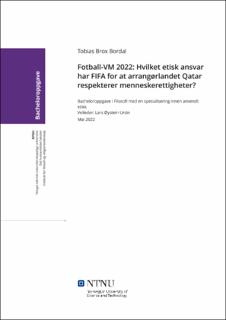| dc.contributor.advisor | Ursin, Lars Øystein | |
| dc.contributor.author | Bordal, Tobias Brox | |
| dc.date.accessioned | 2022-07-13T17:19:42Z | |
| dc.date.available | 2022-07-13T17:19:42Z | |
| dc.date.issued | 2022 | |
| dc.identifier | no.ntnu:inspera:109377277:64187968 | |
| dc.identifier.uri | https://hdl.handle.net/11250/3005190 | |
| dc.description.abstract | Verdensmesterskapet i fotball arrangeres i 2022 i Qatar. Grunnet mangler på sportslige grunnlag for tildeling, og Qatars problematiske forhold til menneskerettigheter er tildelingen av mesterskapet til Qatar svært kontroversielt. Kritikken mot Qatar og FIFA har derfor florert, og mange mener FIFA burde tatt mer ansvar. Teksten tar for seg denne problemstillingen og diskuterer denne opp mot flere teorier. Først presenteres tre etiske teorier. 1: Utilitarisme som fokuserer på konsekvensen av en handling. 2: Deontologi som tar for seg intensjonene bak en handling, og den etiske plikten en har. 3: Dydsetikken som tar for seg hvordan en må handle dydig for å karakteriseres godt, og å være en etisk aktør. Deretter tar teksten for seg CSR teori presentert av R. Edward Freeman, Archie Carroll og Benedict Sheehy. Videre går teksten over til å anvende de etiske og CSR-teoriene opp mot problemstillingen rundt menneskerettigheter i Qatar, og hvilke ansvar som kan tillegges FIFA. Teksten argumenterer for hvorfor CSR gjelder for FIFA, og hvilken betydning det har for deres drift. Teksten konkludere deretter med at FIFA har ansvar overfor menneskerettighetene, samt å sørge for at aktører dem er tilknyttet til også overholder rettigheten. Teksten anvender så dette over på FIFAs situasjon i Qatar, hvor det blir konkludert med at FIFA har et etisk ansvar overfor bruddene for menneskerettigheter som har forekommet i Qatar. | |
| dc.description.abstract | The football world cup will in 2022 take place in Qatar. Due to the lack of sporting reasons for this, as well as Qatar’s problematic relation to human rights, the awarding of this World Cup to Qatar is very controversial. The critique of Qatar and FIFA has therefore flourished, and many believe FIFA ought to take on more responsibility than they do. This text addresses the thesis of this and discusses this up against numerous theories. Firstly, three ethical theories are presented. 1: Utilitarianism which focuses on the consequences of one’s action. 2: Deontology which focus on the intention behind one’s action, and your ethical duty. 3: Virtue ethics which is concerned with how one ought to act with virtue to become, and be characterized, as good, and to be an ethical agent. Then the text presents theories of CSR presented by R. Edward Freeman, Archie Carroll, and Benedict Sheehy. The text proceeds to apply the ethical and CSR theories to the problems of human rights in Qatar, and which responsibility that can be asserted to FIFA. The text argues for why CSR apply to FIFA, and what this means for their governing. The text then proceeds to conclude that FIFA indeed do have certain responsibilities concerning human rights, as well as they are responsible to ensure that their partners also comply with these rights. The text then applies this to the situation of FIFA in Qatar, where it is concluded that FIØFA indeed have an ethical responsibility for the human rights violations that occur in Qatar in preparations for The World Cup. | |
| dc.language | nob | |
| dc.publisher | NTNU | |
| dc.title | Fotball-VM 2022: Hvilket etisk ansvar har FIFA for at arrangørlandet Qatar respekterer menneskerettigheter? | |
| dc.type | Bachelor thesis | |
